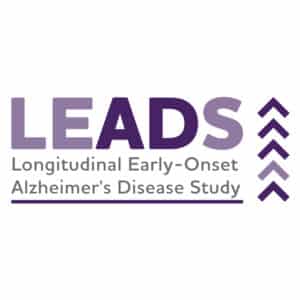
The Longitudinal Early-onset Alzheimer’s Disease Study (LEADS) is a non-treatment national research initiative for adults diagnosed with early-onset Alzheimer’s disease (EOAD) and cognitively normal adults. Researchers will collect data from both groups to better understand EOAD. The study will look at the relationship between clinical, cognitive, imaging, genetic and biomarker tests to better understand EOAD.
Who may be eligible to participate?
- Individuals age 40 to 64 with a diagnosis of Mild Cognitive Impairment (MCI) due to Alzheimer’s disease (AD) or probable AD dementia
- Participants must have a reliable study partner who can provide information to our research staff about the participant’s functioning and accompany the participant to study visits for the duration of the study.
- Must be willing and able to complete an MRI scan, PET scans, and other study procedures.
What happens during study visits?
All participants will be asked to come in for an initial screening visit to determine eligibility and a baseline visit. These visits will be spaced out over multiple days in about 60 days.
Screening and baseline procedures include:
- Review of medical history, family history and medications
- Tests of memory and thinking
- Neurological and physical exams
- Amyloid PET scan
- Genetic counseling
- MRI scan
- Tau PET scan
- Blood tests
- Optional lumbar puncture
All participants will return for annual follow-up visits with various study procedures.
Compensation
Participants will be compensated for their time and travel.
Consent
Before enrolling into the study, the participant and study partner must read, understand, and sign a formal consent form, which fully explains the study.
Contact
Daniel Papa
daniel.papa@pennmedicine.upenn.edu